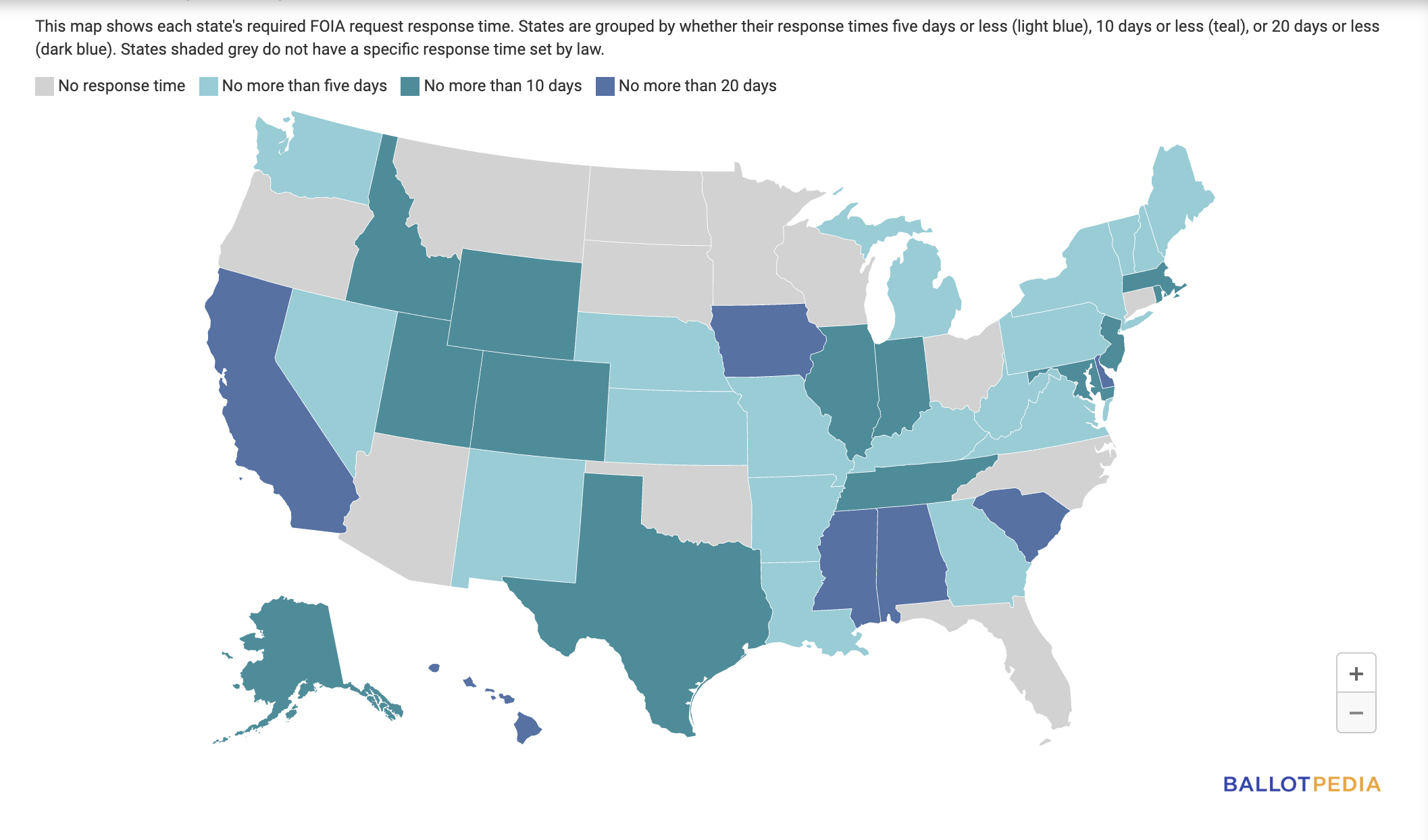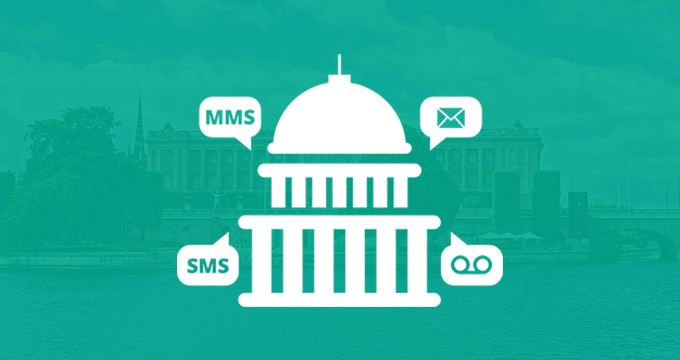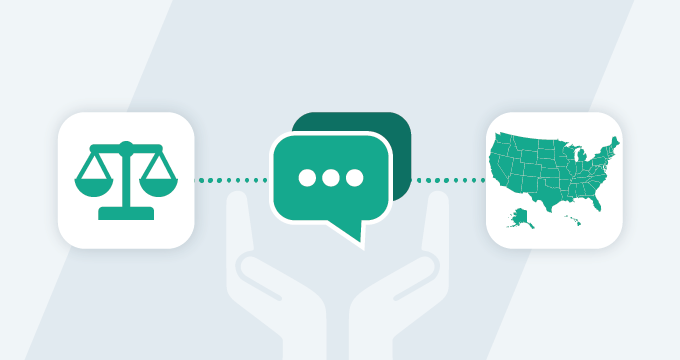If something’s urgent and you want the other person to read and respond fast, you won’t send an email. You’ll text them.
The same goes for government agencies.
The benefits of mobile communication are clear — 98% of text messages get opened, 90% are read within 3 minutes and 90% are answered within a minute.
The immediacy and effortlessness of texting is unparalleled, especially when compared to email.
But what about SMS compliance and archiving, and how long should government agencies keep text messages?
In this article, you’ll learn:
- 5 reasons why local, state and federal government uses text messages
- What laws regulate government archiving and text message retention?
- How your agency can improve text message and public records management
How Does the U.S. Government Use Text Messages?
These are the 5 common ways U.S. public agencies use text messages to communicate with citizens:
- Alerts: to notify citizens about natural disasters, missing children, immediate threats to public safety, weather updates.
- Notifications: to share and update citizens on voting information, notifications about appointments, court hearings, exam schedules.
- Public transportation: to provide real-time updates on schedules, delays, and service changes to commuters.
- Crisis hotline: to provide support and resources in cases of mental health or domestic violence crises.
- Public health information: to share important health information like updates on Covid numbers or vaccination schedules.
These text messages can contain sensitive information and may need to be reproduced in court as evidence.
This is just one reason why public agencies need to retain text messages.
Let’s explore this further.
Government Archiving and Text Messages: Reasons to Archive SMS
The main reasons for government agencies to retain text messages include (we break them down below)
- Compliance with archiving regulations
- Public records requests
- Legal protection and easier ediscovery
- Increased transparency and accountability
- Better information retrieval
And here’s more information about why governments need to archive text messages.
Compliance with government SMS archiving regulations
Government agencies (both on the state and national level) need to stick to strict archiving regulations. These regulations vary by location but generally include acts like Open Records Acts/Sunshine Laws, the Federal Records Act, and the Freedom of Information Act (FOIA) (more details later).
These laws require government agencies to maintain records of employee communications in an easily accessible format that can be provided to the public upon request.
Regulators emphasize the importance of archiving cell-phone generated electronic communication, including iOS and Android messages, WhatsApp chats, voice calls, and text messages.
These records must be searchable and retained for a required number of months or years.
Also, government agencies must comply with NARA (National Archives and Records Administration) requirements. These requirements mandate that US public agencies:
- Maintain an audit trail for electronic records
- Make sure to prevent any unauthorized access to electronic records
- Safeguard against tampering of archived records
- Establish, monitor, review, and update access controls for electronic records across the organization
Public records requests: FOIA and Sunshine Laws
To ensure transparency and government disclosure in the US, several laws have been enacted that require that government records be open to public observation.
Freedom of Information Act (FOIA)
The Freedom of Information Act (FOIA) gives the public the right to request access to federal records, which agencies then need to disclose, typically within 6 months (up to 8 weeks for simple requests).
Today, these records also include paperless (digital) correspondence ‒ email, social media, chat apps, calls, voicemail and text messages.
Text messages came into focus when, familiar with strict email retention laws, government representatives used mobile messaging to evade communicating through official channels and evade public records requests.
This caused changes in legislation and inclusion of mobile content into the definition of what constitutes a business record.
Did you know that if an employee deletes an incriminating text message from their phone, the mobile carrier typically keeps it only for up to 5 days?
Imagine what would happen if somebody made a FOIA or ediscovery request and it turned out that your agency had no means of recovering it?
The Freedom of Information Act clearly mandates that text messages are considered public records and obliges agencies to retain those records by archiving government work-related mobile device conversations and texts.
To locate, review and produce records in accordance with strict state-imposed deadlines, organizations use archiving or FOIA management software.
Sunshine Laws
While FOIA applies only to federal agencies, individual US states have enacted similar legislation called Sunshine Laws to ensure transparency on a local and state level.
Public state agencies and officials that use mobile devices for official, business purposes should have the ability to comply with archiving requirements mandated by the state-imposed public records laws.
The deadline for the production of requested records varies by state, and is as short as 5 days in states like New York, Pennsylvania, Michigan, and others.

Source: Ballotpedia
NARA
The National Archives and Records Administration (NARA) released a directive which deals with how government agencies should manage electronic records, including mobile communication.
Some of the crucial points in the directive highlight the need to store and retain records in a trustworthy and tamper-proof manner, as well as the ability to locate, retrieve and deliver them in a timely manner.
To stay compliant with NARA, agencies need to be able to:
- define, monitor, review and update access to electronic records,
- prevent unauthorized access, tampering, deletion or destruction of archived records and
- have audit trail and legal hold capabilities.
Legal protection and easier ediscovery
There can be cases where text messages may be required as evidence in court.
A good example of legal cases where the government was communicating with citizens is a case involving allegations of police misconduct or civil rights violations.
In such cases, text messages exchanged between law enforcement officers and citizens can be crucial pieces of evidence to establish the facts and circumstances surrounding the incident.
|
Example legal case scenario involving text messages by government officials A citizen alleges that they were subject to excessive force or racial profiling during a police encounter. If the government was communicating with citizens through text messages, the following types of text messages could be relevant: Text messages between officers — Text messages exchanged among police officers involved in the incident may reveal conversations or plans related to the encounter. These messages can help establish whether there was any intent or premeditation in the actions of the officers. Text messages between officers and dispatch — Text messages between officers and police dispatch may contain information about the nature of the call, any instructions given to the officers, and the timing of their response. This can help establish the context of the encounter. Text messages between citizens and officers — Text messages exchanged between the citizen involved and the responding officers could provide insights into the communication and interaction between the parties leading up to and during the incident. Text messages from eyewitnesses — If there were witnesses to the incident who communicated with the government (e.g., by reporting the incident to law enforcement), their text messages may contain important information about what they observed and reported. Text messages from public officials: If public officials, such as city officials or government representatives, were involved in communications related to the incident, their text messages could shed light on the government’s response and handling of the situation. Conclusion: The text messages may serve as evidence to:
|
|---|
Increased transparency and accountability
Text message archiving ensures that government agencies maintain a transparent record of their communications. This helps to establish accountability in government operations.
Better information retrieval
When a FOIA or a Sunshine Law request comes in, government agencies need to act fast.
Having an organized archive of text messages can save time and resources when searching for specific information or communication threads to meet the request. This efficiency is especially valuable in agencies dealing with a high volume of messages.
When agencies get an open data request, they typically follow a well-defined process to fulfill the request while ensuring compliance with the law.
Here’s a general overview of the typical process:
- Receipt of the FOIA request. The agency receives a written FOIA request from a member of the public. The request can be submitted via direct mail, email, or an online FOIA portal if the agency has one.
- Initial review: The FOIA officer (or designated staff member) reviews the request to ensure it meets the formal requirements of a FOIA request.
- Acknowledgment of receipt: The agency provides a written answer to acknowledge receipt, provides a tracking number and an estimated timeline for responding.
- Search and retrieval of records: The agency identifies and locates the records that are responsive to the FOIA request. This may involve searching through paper documents, electronic files, emails, chat histories, and text messages.
- Review for exemptions: The FOIA officers review the identified records to check if any of the information is exempt from disclosure under FOIA. There are nine specific exemptions (e.g., national security, personal privacy, law enforcement records) that may be applied to withhold certain information.
- Redaction: In case the records contain any matters of national security, private information, or sensitive data, the agency will need to redact it (black out using a special software) and then release the non-exempt information. The agency also needs to explain why specific information has been withheld.
- Response: The response is reviewed and approved by appropriate agency officials, which may include legal counsel and FOIA officers, to ensure compliance with FOIA requirements. The agency then sends the response to the requester, by mail or email.
Text Message Archiving for Governments
Archiving text messages simplifies the process of searching, retrieving, reviewing and redacting the requested information in response to such requests.
The right data archiving software can cut the time needed to respond to a request by 70%.
To ensure compliance with federal and state regulations and speed up their public records request response times, government agencies use data archiving solutions to retain, search, and produce email, social media and text message records.
This, together with a text messaging policy, helps government agencies establish better control and overview of how SMS is used.
If you’re a government agency looking to archive text messages (but also any other type of electronic communications), here’s what to look for when evaluating vendors.
- Compatibility for multiple mobile carriers and devices: It’s also important to ensure the archiver can work with employer-issued and BYOD phones.
- Indexing and metadata: Make sure the archiver has powerful indexing functionalities which also index metadata (like the time, date, sender, recipient, record category, file size, read receipts, etc.)
- Search: Find messages by phone number and keywords, and filter by date range.
- Disposal options: The system should be able to automatically delete messages in bulk once the retention period expires, as such records no longer have any business and compliance value to the organization.
- Audit trail: Having a full trail of all user activity on the platform will give you a more effective control over data and facilitate compliance. You can also see who is working on which FOIA case.
- Integration and customization: If your agency’s already archiving email and social media, it would be both cost-effective and practical to integrate the text message archiving capabilities into an existing solution. Essentially, the system should be customized for your enterprise configuration.
- Redaction: The archiving system should have an integrated redaction feature to protect sensitive or confidential information within text messages.This way, you can obscure or black out specific portions of text, images, or data, making them unreadable. This will ensure that exempt, confidential information remains hidden while allowing non-sensitive parts of documents to be shared or disclosed as part as your FOIA request response.
- Export of records: The system should produce mobile communications in native and standard non-native format.
Jatheon Cloud is an AWS-based data archiving software, what allows users, FOIA officers and compliance managers to retain, search, and produce various types electronic records like email, social media, chat apps, voice calls, and text messages.
Jatheon supports the archiving of phone calls and text messages from most mobile carriers around the globe, and offers support for SMS, MMS, iMessage and voicemail archiving using both carrier deployment and Android and iOS apps.
If you’re looking for more information on text message archiving for all industries, check out this guide: Why Your Organization Needs to Archive Mobile Communications.
To see a demo of Jatheon Cloud text message archiving options, contact us or book a tour here.
FAQ
Do governments use text messages to communicate to citizens?
Yes, U.S. government agencies use text messages as a communication channel to reach citizens. Text messages are often used to provide important information, alerts, updates, reminders, and notifications. These messages can cover a wide range of topics, including emergency and extreme weather alerts, AMBER alerts for missing children, public health information, government program updates, or tax notifications.
Does FOIA affect text messages?
Yes, both text messages and instant messages are likely records subject to FOIA. FOIA mandates that all government agencies retain text messages that pertain to public business. This includes both personal and employer-issued mobile phones.
Is a text message a public record?
This depends on the laws of the state in which it was created and sent. In general, text messages that are created or sent by a government official in the course of their official duties are considered public records. This is true even if the text messages were sent from a private cell phone.
Are text messages discoverable in court?
Yes, text messages are discoverable in court. In most jurisdictions, text messages are considered to be “documents” or “communications” for purposes of discovery, which means that they can be obtained by the opposing party in a lawsuit if they are relevant to the case.








